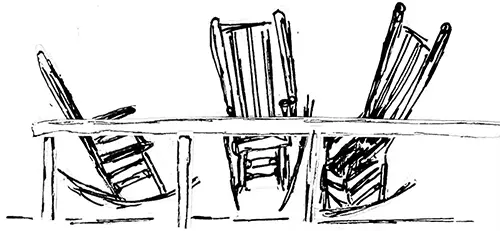The Stump 341
Reject the Consumer: Imagining A New Identity Politics
Freeing ourselves from the corrosive Consumer identity isn’t an individual task, but a call for system change rings hollow if we are afraid of personal change. How can we imagine…
Back to the Bottom-Line (Apocalyptically and Practically Speaking) at the Land Institute
Wendell Berry has written endlessly about the goodness of local work; if, for Berry, the goodness of such work is connected to agrarian virtue, while for Jackson it is connected…
On Scruton and Settling: From the Editor
Scruton, from that day in France until the end, could never situate himself in the fugitive and cloistered comfort of the academic and intellectual orthodoxy.
Two Yells for Football?
If beer and football are just the modern bread and circuses of a declining empire, then these are spectacles best avoided. However, if such gridiron microcosms of the human experience…
The Elephant in the Formula Can: Medicine’s Overlooked Influence on Breastfeeding Failure
To acknowledge the harm that has been inflicted on uncountable human lives is to invite doubt about the underpinnings of our technologically sophisticated world. That is an uncomfortable and lonely…
The Jeffersonians on the Margins of NatCon
What is being outlined here is fundamentally a Wendell Berry conservatism: our solutions are not global in nature. They might not even be national in nature. It asks individuals to…
Uprooted
We are the blind, each calling out that which we are so sure we see. No longer aware that the sight we now marvel at is little more than one…
Ride Into the Day: Images That Remain
“Choose you this day whom you will serve,” the Old Testament leader, Joshua, charged his fellow Jews. And that choice, while crucial, while fundamental, must also be borne out during…
Reality’s Bite: Responding to the Reality Privilege Argument
Are those who question transhumanist progress or Metaverse predictions just knee-jerk Luddites whose visceral reactions are worthy of only a patronizing pat on the head for not seeing their own…
Politics and the Petting Zoo
What if our expectations of politicians whom we mock or despise are simply unrealistic and guided by the standards of this world? The faith of some regular Americans in their…
Tone-Deaf Experts in the Hour of Grift
Back of all this you might hear a rabble-rousing Palestinian Jew from a couple of millennia ago promising that the truth, once known, will set you free - but that…
Shame and Exceptionalism: Livy’s Subversive History for Liberty
Livy asserts that shamelessness led to decadence which, in turn, led to greed and eventually devolved into demagoguery and tyranny. His assertion that Roman liberty and equality were destroyed by…
Forget Red vs. Blue, America is Cactus vs. Philodendron
Is there a direct causal connection between America’s embrace of succulents and semi-succulents as houseplants-of-choice and the conspicuous mass movement of Americans to states with the least amount of rainfall?…
Dobbs v. Roe: See How They Love One Another
There will be a temptation for many to say: “Good. Roe is gone. Now the rest is none of my business.” It would be wise to remember this disinterest in…
Dr. Rigby’s Ugly Cry
For all the enhanced resolution of our universe Webb brings, for all the material analysis this new device supplies to scientists’ burgeoning cosmic databases, informing the denizens of Earth just…
Hot Mediums, Hot Tempers
Life is inherently unpredictable and requires engagement without certainty of outcome. It also often requires patience. No matter how many labor-saving and time-bending devices we create, we will never exist in…
Immigrant Cemeteries
No one even tried to keep me. The dead, not an argumentative sort to begin with, never had the chance. The living, God bless them, had been so thoroughly tutored…
Another Option for Christian Politics
With simple elements of bread and wine, the church, then and now, celebrates the memory of Christ’s death by partaking of the sacrament of his body and blood. Ignatius wants…
On College, Careers, and Aspirations for Home
These modern forms threaten the desire for familial and communal life—an aspiration traditionally associated with conservatism, especially the conservatism inherited from Aristotle, Cicero, and Burke. The spirit of the careerist…
Renunciation and Re-enchantment
We live in a society where lust, greed, gluttony, sloth, wrath, envy, and pride have been commercialized. When the self and its desires are everywhere celebrated, to contain the self…
Faithful Lives in Faithless Times
To the tomb, all life hastens. But while death is ineluctable, the growing good of the world is not. There is an intrinsic vulnerability to civilization (and parenthood), in large…
Open and Closed: From Russia to China to America, the Largest Societies are Pushing Their Limits
Despite Americans’ instinctive openness, decades of deadly overdoses and mass shooting victims remind them that there have to be boundaries. The difficulty of controlling protests in Russia and China reminds…
“Great Men” and Great Expectations
We may heap much of the blame or praise upon generals and czars and presidents, but they are rarely in the trenches. We may want to avoid taking responsibility for…
Pawns On the Board, on Both Sides of the Pacific
The last few years have shown that liberty and truth are felt less in the bones by each new cohort of educated élites who will go on to craft policy.…
















